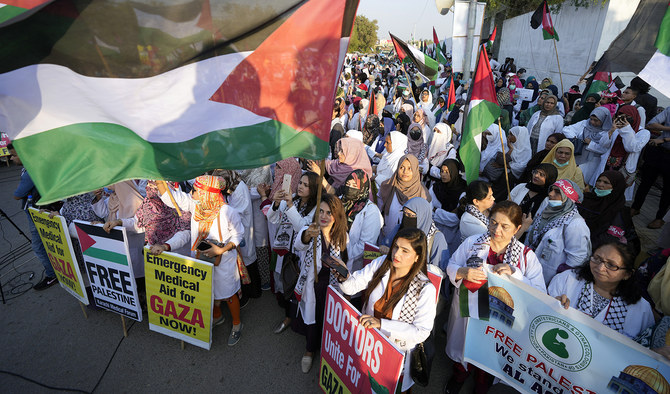KARACHI: Hundreds of Pakistani doctors and paramedics marched in the southern port city of Karachi on Sunday to protest against Israel’s war in Gaza, demanding an immediate ceasefire amid the deteriorating human rights situation in Palestine.
The march took place in Pakistan’s commercial hub as the humanitarian crisis in Gaza amid increasing Israeli hostilities in Gaza. On Sunday afternoon, the Gaza health ministry said almost 18,000 Palestinians had now been killed by the Israeli military since Oct. 7.
Pakistani journalists, rights activists and celebrities have been consistently calling for an end to Israeli bombardment in Gaza and demanding an immediate ceasefire. On Sunday evening, a large number of doctors and paramedics took out a “White Coat March” from Karachi’s National Stadium signal to Liaquat National Hospital, calling for an end to Israel’s “war crimes.”
The event, which was organized by the Karachi Medical Forum, was attended by Interim Sindh Health Minister Saad Khalid Niaz, leaders of the Jamaat-e-Islami religious party, Pakistan Medical Association (PMA), the Pakistan Islamic Medical Association (PIMA), and members of the Palestine Foundation in the country.
“Today in Karachi, thousands of doctors marched, demanding immediate end to human rights violations, bombing of civilian areas— particularly hospitals,” PIMA wrote on social media platform X.
Hundreds of doctors can be seen in several video clips on social media platforms, marching as they held up placards that read: “Where are human rights? Where is the Geneva Convention?”
Several other placards read: “Doctors, unite for Gaza.”
In a statement, the JI said its Karachi leader Hafiz Naeem ur Rehman appreciated Pakistani doctors for highlighting Israeli war crimes in Gaza.
“He [Rehman] said that by all means, Israel is an illegitimate, terrorist state whereas Hamas is fighting for the liberation of her homeland,” the statement added.
On Sunday, Pakistan’s Caretaker Prime Minister Anwaar-ul-Haq Kakar said Israel’s “purposeful” targeting of Palestinians in Gaza violated all standards of human rights and was a breach of international law.
His statement came as the world marked International Human Rights Day. Pakistan does not recognize the state of Israel and calls for an independent Palestinian state based on “internationally agreed parameters” and the pre-1967 borders with Al-Quds Al-Sharif as its capital.
















